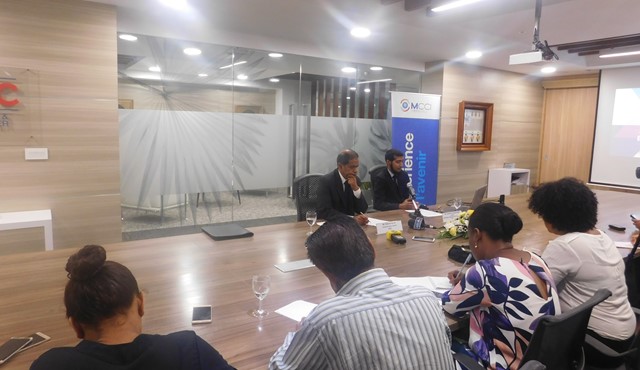Business updates

Sustained increase in the Business Confidence Indicator at + 8.0 points
Economy 14 Nov 2018
The MCCI released its Business Confidence Indicator for the 3rd quarter of 2018 on Wednesday 14 November 2018, through a press conference.
The latest quarterly business survey shows that business confidence continued to rise in the third quarter of 2018. The balance of opinions remained firmly in the positive territory at 8.0 balance points, with slight fall from the 8.2 points achieved in the second quarter of 2018.
The Mauritian economy is intrinsically linked to the global economy. We notice that the economic tendency at the global level is similar as to Mauritius. According to the CesIFO institute, the global economic climate grew much less positively in the third quarter of 2018, after reaching its peak at 26.0 balance points in the first quarter of the year. The indicator has returned close to the level achieved in the first quarter of 2017, at +2.9 points.
This analysis is confirmed by international institutions.
The IMF confirms in its latest publication that the global economic activity continues to remains solid but the expansion is becoming less vigorous and less balanced.
This institution decreased its growth forecasts this October. It favours a macro-economic scenario where the global growth rate, as measured by GDP, to increase by 3.7 percent in 2018, 0.2 percentage points lower than forecast in April and July 2018. It is now clear that economic growth and expansion is less synchronised with diverging cyclical positions by different economies.
In Mauritius after a turnaround in the last quarter of 2016, the business confidence indicator has been evolving in the positive area irrespective of the sector of activity or the size of the business. After exponential upturns in 2017, the growth in business confidence has been steady over the first three quarters of 2018.
Demand remains one of the key engines of growth in the Mauritian economy, with more than 44 percent of entrepreneurs indicating that an increase in demand has been one of the most significant factors affecting their businesses. The combined effects of the implementation of purchasing power policies over the last 18 months [1], an increase in the average monthly earnings of employees to reach approximately Rs. 30,000, as well as relatively lower interest rates has had an effect on consumption expenditure.
The planned increase in investment observed during the last quarter is confirmed with more than 60 percent of entrepreneurs indicating that they would increase their investment expenditure in the next twelve months. Investment remains predominantly in Plant & Machinery, indicating that entrepreneurs are investing in new production lines and markets. This is confirmed by the fact that approximately 40 percent of entrepreneurs have indicated that their strategies for diversification of products and the tapping into new markets have contributed positively to their business performance during the second quarter of the year. The remainder of the increase in investment is equally divided between investments in Buildings and R&D Expenditure. We therefore anticipate a higher use of the double deduction on R&D expenditure, a measure which has been under-utilised in its first year of application.
Employment is expected to continue to improve with more than 30 percent of entrepreneurs indicating an increase in employment over the next 3 months. The majority of enterprises are expecting to maintain their employment levels whilst less than 5 percent of companies are engaged in a restructuring and downsizing exercise. More than 60 percent of companies point to an increase in global and local demand as the main reason for their employment policies.
Exports of goods and services continue to increase, albeit modestly, with a balance of opinion of exports at 3.9 points.
On the constraining factors, with an unbalanced economic growth at the global level, and increasing downside risks related to geopolitical tensions, tighter financial conditions, local entrepreneurs are faced with a more prominent competition both domestically and globally. This is accentuated by some 27 percent of entrepreneurs pointing to an increase in the cost of doing business. Recruitment difficulties and skills mismatch are, as well as high freight related charges, and administrative procedures remain stumbling blocks to a dynamic increase in the performance of entrepreneurs.
Based on the business climate results for the first three quarters of 2018, we estimate that the economic growth in the third quarter of 2018 was of 3.8 percent. Our econometric projections for the full year 2018 is that growth should be of approximately 4 percent, the first time this figure is reached since 2011.
Similar to the situation in the world economy, we are experiencing a prudent optimism of entrepreneurs as regards to the economic environment.
The full report can be accessed here.
[1] Negative Income Tax, Minimum Wage, Lower tax band for middle income-earners





